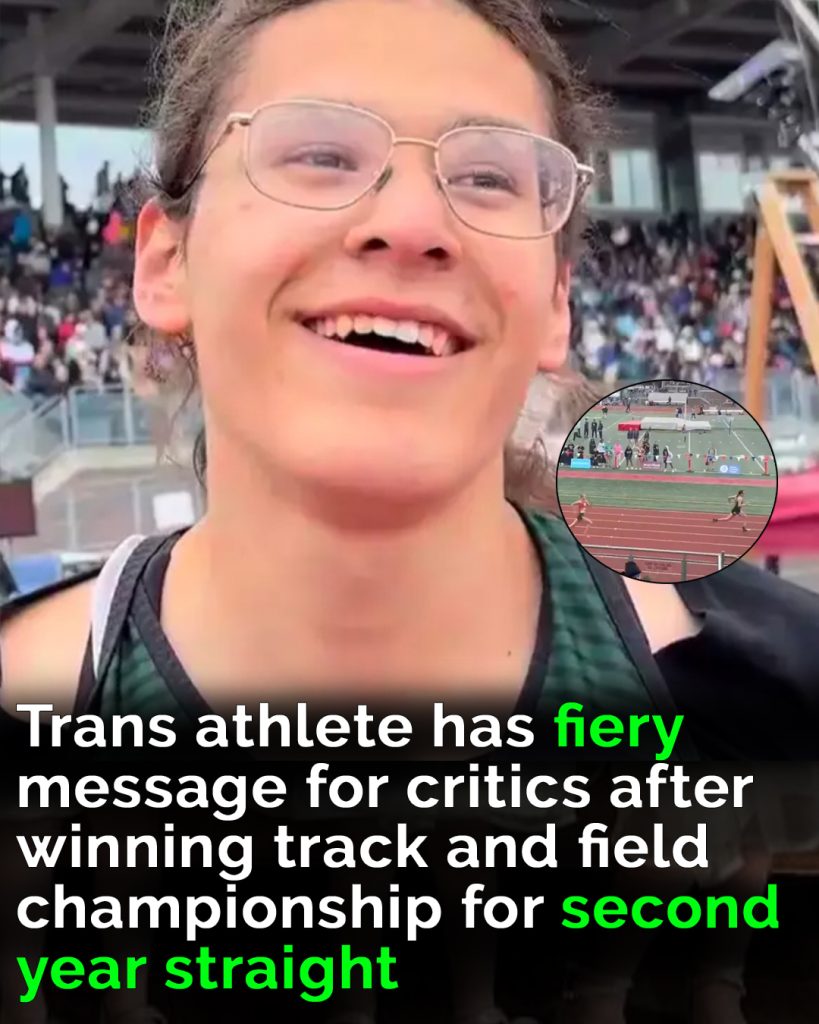A transgender teenage athlete is at the center of a fierce debate after her dominant win at a Washington state girls’ track championship was met with a wave of boos from the crowd. Seventeen-year-old Verónica Garcia clinched the title in the Class 2A 400-meter dash, finishing with a time of 55.70 seconds. Her performance was undeniably strong, but instead of universal applause, the stadium echoed with mixed reactions—some cheering, but mostly jeering.

Garcia, a student at East Valley High School in Spokane and a transgender girl, is no stranger to controversy. Last year, she faced similar backlash when she sprinted down the final stretch to win her first state title. This year, nothing changed. As she crossed the finish line again as a champion, the reaction from the stands made it clear that her presence in the competition remained a lightning rod.
During the medal ceremony, the applause for other athletes was loud and enthusiastic, especially for those wearing shirts that read “Save Women’s Sports.” But when Garcia’s name was announced as the 400-meter champion, the tone of the crowd shifted. Boos rang out, and the moment that should have been celebratory was instead filled with tension.
One person near the starting blocks repeatedly shouted “let’s go girls!”—a not-so-subtle jab at Garcia’s inclusion. The crowd’s disapproval wasn’t new to her. “I’ll be honest, I kind of expect it,” Garcia told the Seattle Times after the competition. Now a two-time state champion, she says the criticism only fuels her drive. “It maybe didn’t have their intended effect,” she added. “It made me angry, but not angry as in, I wanted to give up, but angry as in, I’m going to push.”
Garcia cited civil rights icon Martin Luther King Jr. to frame her motivation. “One of the things that Martin Luther King always pointed out is that you have to do what’s right. Even if there comes risk, you still have to do what’s right.”
🚨BREAKING: A boy competing under the name “Veronica” Garcia just stole the state title in the girls’ 400m at the 2A Washington State Championship meet.
Who’s shocked?
Congratulations to Lauren Matthew, the real Washington State Champion in the girls’ 400m. pic.twitter.com/dFbgdmc15S
— Riley Gaines (@Riley_Gaines_) May 31, 2025
While Garcia celebrated another state victory, her closest competitor, Lauren Matthew, who finished second with a time of 56.75 seconds, voiced her frustration. “I shouldn’t have to push myself to the point where I’m about to, like, die in order to win,” Matthew said in an interview with the Spokesman-Review. “I know I’m gonna push myself to keep going, but I don’t want a man pushing me to have to go,” she added, echoing a sentiment shared by many critics of transgender participation in girls’ sports.
Supporters of sex-based categories argue that the biological advantages stemming from male puberty, even after hormone therapy, give transgender women an unfair edge. They believe these physiological differences create a fundamentally uneven playing field. On the other hand, advocates for inclusion stress that access to sports and the validation of identity are critical to the well-being of transgender youth.
Garcia’s win quickly made waves online, where the criticism intensified. Many social media users misgendered her and questioned the legitimacy of her victory. Former competitive swimmer and activist Riley Gaines, a vocal opponent of transgender women competing in women’s sports, shared a video of the awards ceremony on social media. “Look at the girls on the podium when the rightful champ, Lauren Matthew, is announced vs when the boy who stole her state title is announced,” she wrote. “She is applauded. He is booed.”
Others took to social media to express their outrage. One user tweeted, “Boy pretending to be a girl, Veronica Garcia, cheats in the girls’ 400m at the 2A Washington State Championship meet… Lauren Matthew, a girl, was robbed of her rightful win.” Another user suggested a separate competition category for transgender athletes: “Can we give transgenders their own category so we can stop this, they don’t belong going vs women. Period.”
However, not everyone agreed with that idea. One response angrily dismissed the notion: “NO!!!! They should play men!!! They do not deserve their own category. They are average athletes at best that want a champion first place trophy and they absolutely in no way deserve one.”
Through all the noise, Garcia remains firm in her identity and her right to compete. “I’m really proud of myself. I did what I came to do, and that’s good enough for me,” she said. As for the backlash, she added, “I’m going to put this in the most PG-13 way—I’m just going to say it’s a damn shame they don’t have anything else better to do. I hope they get a life. But oh well. It just shows who they are as people.”
Following the meet, Gaines posted an image of Lauren Matthew holding a sign that declared her the “real girl” and the rightful champion. That image, like the boos in the stands, represents a growing national divide.
It’s clear that Verónica Garcia isn’t backing down. And neither are the voices on either side of this debate. As more transgender athletes like Garcia step onto the field and as athletic governing bodies continue to refine their rules, the conversation about gender, fairness, and sports shows no signs of slowing down.
School sports are increasingly becoming a focal point in the broader societal conversation about identity, rights, and fairness. With every race run, athletes like Garcia are not just chasing personal goals—they’re also navigating a deeply polarized cultural moment.
What do you think about transgender athletes competing in girls’ sports? Share your opinion—and share this story to keep the conversation going.





